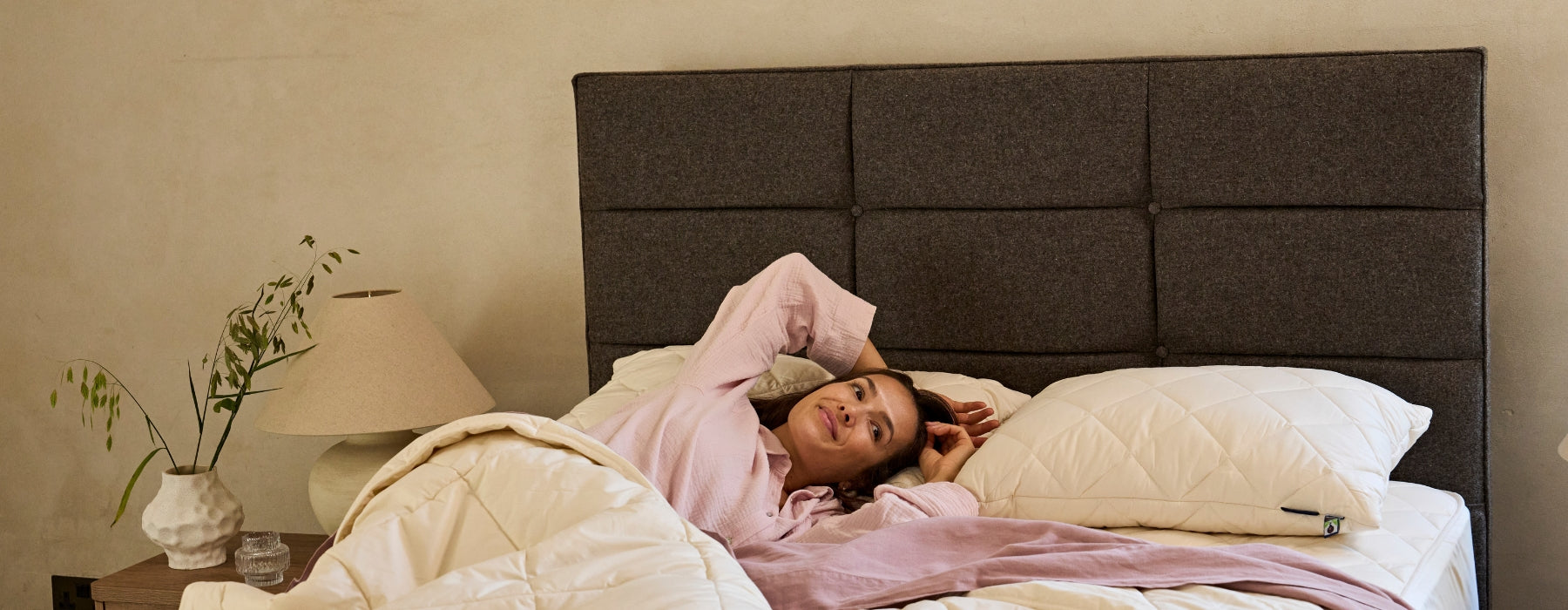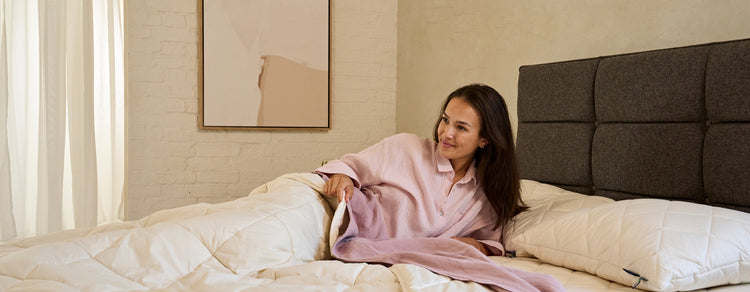Points clés à retenir :
-
Privilégiez votre environnement de sommeil : utiliser une literie respirante et naturelle (comme la laine) qui aide à réguler la température et à réduire les allergènes peut améliorer la qualité du sommeil.
-
Instaurez une régularité et un rythme : instaurer une routine de détente avant de dormir, s'exposer à la lumière du soleil le matin, éviter les écrans lumineux le soir et respecter un horaire de sommeil régulier contribuent tous à réguler votre rythme circadien et à améliorer la qualité de votre sommeil.
-
Surveillez vos habitudes de vie : réduire votre consommation de caféine après le milieu de l’après-midi, éviter l’alcool en fin de journée, terminer vos repas 2 à 3 heures avant de dormir, vous hydrater plus tôt et faire de l’exercice plus tôt dans la journée influencent tous la qualité de votre sommeil.
-
Concentrez-vous sur la récupération et la relaxation : réduire la stimulation mentale avant le coucher, intégrer la pleine conscience ou les bains chauds, tenir un journal de gratitude et limiter les facteurs de stress en fin de soirée contribuent tous à améliorer votre sommeil profond, votre sommeil paradoxal et les indicateurs de variabilité de la fréquence cardiaque utilisés par les objets connectés.
Pour améliorer son score de sommeil, plusieurs solutions peuvent venir immédiatement à l'esprit. Réduire le temps passé devant les écrans, dormir dans l'obscurité et utiliser un bruit blanc semblent des évidences. Mais permettent-elles réellement d'obtenir le score parfait de 100 ?
Nous utilisons notre expertise en matière de sommeil pour analyser les tendances des scores de sommeil et ce que signifie obtenir non seulement un bon score, mais aussi une meilleure nuit de sommeil, nuit après nuit.
21 façons d'améliorer votre score de sommeil (une fois pour toutes)
Pour améliorer la qualité de votre sommeil, voici 21 astuces pour un sommeil de meilleure qualité et durable, et non un simple résultat ponctuel. Si votre sommeil vous importe, vous appliquez probablement déjà certaines de ces astuces. Mais il en existe d'autres, peut-être moins connues, qui pourraient améliorer la qualité de votre sommeil à court et à long terme.

Les dispositifs biométriques comme les Apple Watches, Woop, Oura Ring et Garmin font d'un bon score de sommeil une priorité et un indicateur très recherché.
Réfléchissez à ce sur quoi vous dormez et à ce en dessous.
-
Utilisez une literie respirante et naturelle (comme une literie en laine) pour réguler la température et éviter les surchauffes nocturnes.
-
Investissez dans un matelas et un oreiller offrant un bon soutien et adaptés à votre position de sommeil.
-
Assurez une bonne qualité de l'air, optez pour une literie anti-allergique (la laine est naturellement hypoallergénique) afin de réduire la prolifération des acariens et les problèmes de respiration nocturne.
-
Maintenez votre chambre à une température fraîche, idéalement entre 60 et 67°F ou entre 16 et 19°C.
-
Bloquez toute la lumière avec des rideaux occultants ou un masque de sommeil.
-
Réduisez le bruit en utilisant des bouchons d'oreille, des appareils à bruit blanc ou des applications de bruit rose.
Pour plus de conseils sur la literie respirante et hypoallergénique et découvrir comment elle est la véritable clé pour améliorer la qualité de votre sommeil, consultez notre collection de literie en laine Woolroom .
Améliorer le rythme et la régularité du sommeil
-
Programmez une alarme de relaxation 30 à 60 minutes avant l'heure du coucher.
-
Exposez-vous à la lumière du soleil du matin dans les 30 minutes suivant votre réveil pour ancrer votre rythme circadien.
-
Évitez la lumière vive la nuit, en particulier la lumière bleue des écrans.
-
Adoptez une routine du coucher régulière
-
Suivez votre fenêtre de sommeil optimale
Adapter son mode de vie et sa nutrition
-
Réduisez votre consommation de caféine après 14h.
-
Évitez l'alcool à l'approche du coucher.
-
Prenez votre dernier repas complet au moins 2 à 3 heures avant d'aller au lit.
-
Hydratez-vous bien, mais réduisez votre consommation d'eau le soir.
-
Faites de l'exercice tous les jours, de préférence tôt le matin.

Tenir un journal et réfléchir le soir peut aider le cerveau à se détendre avant d'aller au lit.
Favoriser la relaxation et la récupération
-
Pratiquez la relaxation avant de vous coucher
-
Limitez la stimulation mentale (courriels, disputes ou réseaux sociaux) avant de dormir.
-
Essayez la méditation ou la pleine conscience ; écouter des affirmations positives audio peut vous aider.
-
Prenez une douche ou un bain chaud 1 à 2 heures avant le coucher.
-
Réfléchissez à travers un journal de gratitude
Nous avons écrit davantage sur certaines de ces façons d'améliorer votre score de sommeil :
- Comment réguler son rythme de sommeil
- Commencer un journal du sommeil
- Méditation et pleine conscience avant le coucher pour favoriser le sommeil
Alors, qu'est-ce qu'un score de sommeil ?
Si la santé et le bien-être vous intéressent, vous cherchez probablement à améliorer la qualité de votre sommeil. Les études montrent qu'une bonne nuit de sommeil est essentielle pour optimiser vos performances sportives et professionnelles, et pour permettre à votre corps de fonctionner correctement : rester en forme, perdre du poids (si tel est votre objectif) et traiter efficacement l'information tout au long de la journée. Un bon sommeil est donc indispensable pour bien démarrer la journée.

Pour mieux dormir, il faut d'abord choisir la bonne literie… Pour optimiser votre sommeil, évitez la surchauffe et la sensation d'étouffement nocturne grâce à une fibre naturelle comme la laine.
C’est pourquoi l’idée d’un score de sommeil séduit de nombreuses personnes. Notamment celles qui suivent leurs données biométriques grâce à un appareil connecté – qu’il s’agisse d’une Garmin , d’une bague Oura , d’un Fitbit , d’un Whoop ou d’une Apple Watch . Si vous portez un mini-ordinateur au poignet qui vous indique quand vous lever, quand respirer profondément et quand vous reposer pour récupérer… alors vous êtes probablement tout aussi intrigué par ce « score de sommeil », un indicateur de plus en plus populaire.
Les raisons pour lesquelles votre score de sommeil est si bas
En bref : vous vous concentrez probablement sur les mauvais facteurs. Avant de pouvoir améliorer votre sommeil, vous devez savoir ce qui compte le plus pour une nuit optimale. Voyons d'abord comment le score de sommeil est calculé !
Pour la plupart des appareils portables, les 4 mesures suivantes sont combinées pour déterminer votre « score de sommeil » :
-
Sommeil profond : coucher plus tôt, exercice physique, pas d’alcool.
-
Sommeil paradoxal : moins de stress, rythme régulier, pas de caféine en fin de soirée.
-
VRC : chambre fraîche, bonnes habitudes de récupération, horaires de sommeil réguliers.
-
Fréquence cardiaque au repos : bonne forme physique, hydratation, pas de repas tardifs ni d’alcool.
Soyez attentif à vos habitudes et à votre routine. Consommez-vous plus d'alcool le week-end ? Cela a-t-il un lien avec une moins bonne qualité de sommeil ? Après un entraînement intense, êtes-vous plus agité, avec des courbatures et des difficultés à dormir ? Un coucher tôt après une journée bien remplie, avec une alimentation et une hydratation adéquates, favorise-t-il un sommeil paradoxal de meilleure qualité ?

Choisir une literie en fibres naturelles comme notre surmatelas en laine de luxe est l'un des changements les plus importants que vous puissiez apporter à votre sommeil : hypoallergénique, thermorégulateur et…
Si vous parvenez à isoler ces mesures, vous obtiendrez encore plus d'informations et une meilleure compréhension des facteurs qui peuvent vous aider à obtenir un meilleur score. Toutefois, il y a de fortes chances que si vous avez du mal à mieux dormir, un ou plusieurs de ces indicateurs de sommeil de qualité ne soient pas optimaux.
Un meilleur sommeil nuit après nuit
Chez Woolroom, nous sommes passionnés par les bienfaits de la literie en laine. Des centaines d'heures de groupes de discussion, d'enquêtes et d'études ont démontré que chacun aspire à un meilleur sommeil.
Deux des principaux obstacles au sommeil sont la température (trop chaude ou trop froide la nuit) et les allergies nocturnes (nez bouché, réveils nocturnes dus à la sécheresse buccale, ronflements et insomnies). La laine est une fibre naturelle qui résout ces deux problèmes. Elle agit de façon naturelle tout en étant une fibre durable, biodégradable et naturellement ignifuge.
Nous intégrons tous ces bienfaits dans des produits de literie haut de gamme qui vous permettent de bénéficier de 25 % de sommeil réparateur en plus. Améliorer votre literie résoudra de nombreux problèmes de sommeil et, par conséquent, vous aidera à obtenir le score de sommeil que vous cherchez tant à améliorer.
Pour découvrir d'autres articles de blog sur la santé, le bien-être, le sommeil et le développement durable, rendez-vous sur le Woolroom Learning Center .


